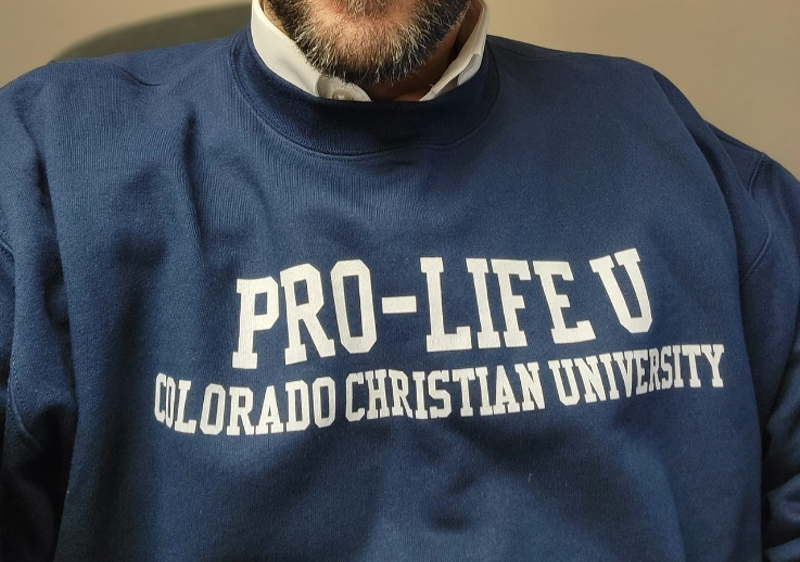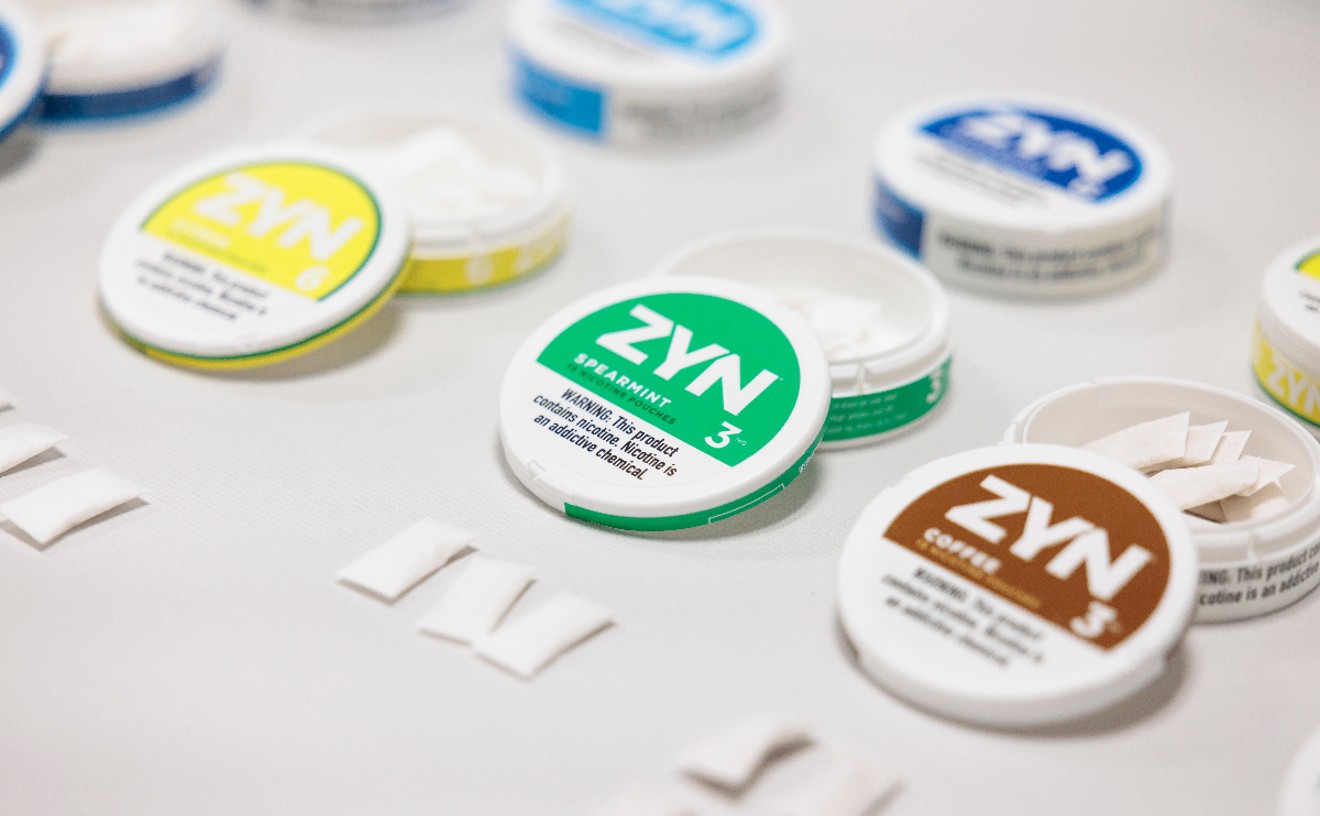Jeff Hunt, vice president of public policy at the Lakewood-based Colorado Christian University (and longtime pot hater), has decided to spark up a public war against the state legislature after being booted from the Senate gallery for a "Pro-Life U" sweatshirt he was wearing to honor CCU.
The public toss-out happened on March 21, while Hunt was at the State Capitol for Pregnancy Resource Center Day. Now the educator says he's weighing whether to legally challenge the dismissal and take it all the way to the U.S. Supreme Court, which has already established that states can't impose bans on political attire at polling sites.
"We are exploring legal options — both on equal treatment and free speech," Hunt tells Westword. "So I would encourage the Senate to get very serious about evaluating whether or not this is something that's important for them to defend, and how they defend it."
Hunt says he was one of many people who went to the Capitol that day to support pregnancy resource and crisis centers ahead of the “Safe Access to Protected Health Care" — aka “RHEA 2.0" — package of abortion bills. All three bills wound up passing, according to State of Reform.
"So we were down there — they were going to introduce all these pregnancy resource centers on the floor of the Senate," Hunt remembers. "They do that 'moment of personal privilege,' and then they welcome guests to the gallery. And so Colorado Christian University — which has as a trade name 'Pro-Life U' — I just wore my sweatshirt down there."
According to Hunt, it took "thirty seconds" before he was spotted in the Senate gallery and ushered away by the sergeant at arms. Cell-phone footage recorded by Hunt shows the calm but awkward interaction going down.
"The sergeant at arms asked me to step outside and pointed to a little sign that said, 'No articles of clothing with political statements allowed,'" Hunt recalls. "I tried to explain to him, 'Well, this is the name of our university.' It doesn't say like, 'Support sanctity of life' or 'Support this bill' or 'Support pregnancy resource centers' — it's just our name. It'd be like someone wearing a Planned Parenthood sweatshirt in. It's just the name of the organization. And I tried to explain that to him, and he said, 'Well, let me call my supervisor.' So he called his supervisor up, and he came to the same conclusion: That it was a political statement and therefore was banned."
Looking at the Colorado General Assembly website and gallery rules on the afternoon of March 31, Westword was unable to find any information about politically charged articles of clothing being prohibited. A statement sent by the secretary of the Senate, Cindi Markwell, that evening said that the site has been updated "to reflect the signage of the gallery doors."
Asked why the rule wasn't on the website, Markwell said, "This has not been an issue before."
The Senate secretary said that Hunt was targeted for expulsion because of the "Safe Access to Protected Health Care" bill package that was up for debate that day.
"These bills drew both pro-life and abortion rights constituents," Markwell explained. "In accordance with custom and practice and as stated on the signage posted on each side of the Senate gallery, no apparel can be worn expressing political statements. The purpose of the policy is to avoid conflict between opposing sides on any particular issue."
And there was a particular issue involved when Colorado Christian University trademarked the "Pro-Life U" tag in January, right before the National Prayer Vigil for Life in Washington, D.C. But the legal issues go beyond the abortion debate.
In Minnesota, a political activist named Andrew Cilek decided to challenge a state law prohibiting voters from wearing T-shirts, buttons and any other items with political messages or statements on them, according to Reuters. He had attempted to vote in 2010 while wearing a T-shirt with a Tea Party logo and the phrase "Don't tread on me," and was initially denied. The U.S. Supreme Court wound up ruling in 2018 that the incident was a direct violation of the First Amendment and that Cilek was wrongly treated.
Hunt — who is also the director of the CCU-affiliated Centennial Institute, a think tank — believes his "Pro-Life U" ejection could lead to a similar situation in Colorado, insisting that a Senate gallery is "something not nearly as political as a polling place, but rather a general public location where laws are written and the public is invited to be there." He also claims that there's been "a double standard" shown by the General Assembly, which has allowed liberal-leaning activists but not conservatives to wear political attire.
Hunt points to the recent demonstrations by East High School students at the Capitol over the past month and a half in response to the Luis Garcia and dean shootings, noting that there have been countless people in the Senate gallery with politically charged statements and phrases on their shirts.
"When East High School was down there protesting, there were lots of pictures of hundreds of students wearing 'Angels Against Gun Violence' sweatshirts in the Senate gallery," Hunt says. "So you kind of look at that and go, 'My goodness. It seems like there's a double standard here.' You don't have one person, you have hundreds of people. Sweatshirts with messages, political messages on them. That was allowed...and then one guy in a Pro-Life U sweatshirt, which is just the name of Colorado Christian University, all of a sudden gets targeted...
"It does raise questions," he adds.
Responding to Hunt's claims regarding East High comments, Markwell told Westword that the reason students and anti-gun advocates were allowed to wear political attire during their recent visits to the Capitol was because "there were no gun bills being heard that day on the Senate floor or in committee."
Markwell added, "That day on the floor, a number of senators from both sides of the aisle took moments of personal privilege to address the students who came to the Capitol that day. ... Although the students attempted to carry a number of signs into the Capitol, security at the doors required the students to leave the signs at the doors. There was also the same signage posted where they entered. ... Since no gun bills were scheduled on the calendar, any anti-violence apparel worn that day would not interfere with any Senate business."
The topic of political free speech is a slippery slope, Hunt notes: First it's "Pro-Life U," next it's the word "Christian," he says.
"Is there going to come a point where 'Christian' in itself is considered a political term?" Hunt asks. "We know Colorado Christian University is a conservative school, so is that name itself — the university itself — going to be deemed a political statement?"
Asked about the free speech argument, Markwell cited Article V, Section 12 of the Colorado Constitution, which says: "Each house makes and enforces rules. Each house shall have power to determine the rules of its proceedings and adopt rules providing punishment of its members or other persons for contempt or disorderly behavior in its presence; to enforce obedience to its process; to protect its members against violence, or offers of bribes or private solicitation."
Speaking on behalf of the General Assembly, Markwell said: "We believe that to protect its process and the senators that the Senate is authorized to limit expression of support or opposition on matters it is debating. This includes verbal statements as well as signs and messages on apparel."
Hunt claims that the sergeant at arms told him that legislative staffers "want to avoid conflict" in the Senate gallery when a bill is up. "So you'll have people of different viewpoints there, watching a bill being debated, and they don't want to have conflict in the gallery," he says.
"That is so broad, and when you start to really dig down into that, you can have just what normal people wear as articles of clothing that can develop into conflict," Hunt concludes. "You can have religious conflict over religious wear that somebody may have. So if that becomes the metric by which we're determining what people can wear in a place like the state Senate, then we're going to have a hard time determining what people can and cannot wear. ... I understand people can write really nasty stuff on a T-shirt, but I still lend to lean toward the freedom of speech — especially in a public place like that."
[
{
"name": "Air - MediumRectangle - Inline Content - Mobile Display Size",
"component": "12017618",
"insertPoint": "2",
"requiredCountToDisplay": "2",
"watchElement": ".fdn-content-body",
"astAdList": [
{
"adType": "rectangle",
"displayTargets": "mobile"
}
]
},{
"name": "Editor Picks",
"component": "17242653",
"insertPoint": "4",
"requiredCountToDisplay": "1",
"watchElement": ".fdn-content-body",
"astAdList": [
{
"adType": "rectangle",
"displayTargets": "desktop|tablet"
},{
"adType": "rectangle",
"displayTargets": "desktop|tablet|mobile"
}
]
},{
"name": "Inline Links",
"component": "18838239",
"insertPoint": "8th",
"startingPoint": 8,
"requiredCountToDisplay": "7",
"maxInsertions": 25
},{
"name": "Air - MediumRectangle - Combo - Inline Content",
"component": "17261320",
"insertPoint": "8th",
"startingPoint": 8,
"requiredCountToDisplay": "7",
"maxInsertions": 25,
"watchElement": ".fdn-content-body",
"astAdList": [
{
"adType": "rectangle",
"displayTargets": "desktop|tablet"
},{
"adType": "rectangle",
"displayTargets": "desktop|tablet|mobile"
}
]
},{
"name": "Inline Links",
"component": "18838239",
"insertPoint": "8th",
"startingPoint": 12,
"requiredCountToDisplay": "11",
"maxInsertions": 25
},{
"name": "Air - Leaderboard Tower - Combo - Inline Content",
"component": "17261321",
"insertPoint": "8th",
"startingPoint": 12,
"requiredCountToDisplay": "11",
"maxInsertions": 25,
"watchElement": ".fdn-content-body",
"astAdList": [
{
"adType": "leaderboardInlineContent",
"displayTargets": "desktop|tablet"
},{
"adType": "tower",
"displayTargets": "mobile"
}
]
}
]












